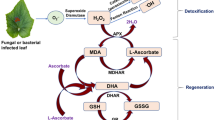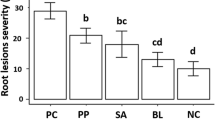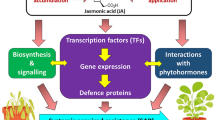Abstract
Catharanthus roseus (L.) G. Don has a broad range of medicinal importance besides its ornamental exterior. In the present work, biotic (fungal) elicitor was prepared from the broth culture of Alternaria alternata (Fr.) Keissl. and applied to detached leaves of one natural variety (rosea) and one synthetic cultivar (Victory red) of C. roseus to induce defense responses. Results showed that fungal elicitor (FE) was able to induce the defense response in both the cases. Defense-related enzymes like peroxidase, polyphenol oxidase, phenylalanine ammonia-lyase, and β-1,3 glucanase showed higher activity along with higher accumulation of total phenol and total flavonoid over the water-treated control sets. The important signaling molecule nitric oxide (NO) was also monitored both biochemically and using fluorescence microscopy. In order to find out the involvement of nitric oxide in this defense responses, different NO modulators were applied to check the defense response in both rosea and victory red. The obtained results showed potential involvement of NO in FE-induced defense responses. We have also checked the efficacy of this elicitor-induced defense responses against Alternaria leaf blight disease in the natural variety and cultivar of C. roseus. The lower amount of disease development and cell death in elicitor treated natural variety and cultivar of C. roseus confirms the protective role of this biotic elicitor against Alternaria leaf blight disease.








Similar content being viewed by others
Change history
28 January 2024
A Correction to this paper has been published: https://doi.org/10.1007/s00344-024-11242-w
References
Abdel-Rahman TM, Kapiel TYS, Ibrahiem DM, Ali EAM (2010) Elicitation of alkaloids by biotic and abiotic stress factors in Catharanthus roseus. Egypt J Bot 27–29:207–224
Acharya K, Chandra S, Chakraborty N, Acharya R (2011) Nitric oxide functions as a signal in induced systemic resistance. Arch Phytopathol Plant Prot 44:1335–1342
Anand T, Chandrasekaran A, Kuttalam S, Raguchander T, Prakasam V, Samiyappan R (2007) Association of some plant defense enzyme activities with systemic resistance to early leaf blight and leaf spot induced in tomato plants by azoxystrobin and Pseudomonas fluorescens. J Plant Interact 2:233–244. https://doi.org/10.1080/17429140701708985
Asai S, Yoshioka H (2009) Nitric oxide as a partner of reactive oxygen species participates in disease resistance to necrotrophic pathogen Botryti cinerea in Nicotiana benthamiana. Mol Plant Microbe Interact 22:619–629. https://doi.org/10.1094/MPMI-22-6-0619
Balasubramanian V, Vashisht D, Cletus J, Sakthivel N (2012) Plant β -1,3-glucanases: their biological functions and transgenic expression against phytopathogenic fungi. Biotechnol Lett 34:1983–1990. https://doi.org/10.1007/s10529-012-1012-6
Baldi A, Srivastava AK, Bisari VS (2009) Fungal elicitors for enhanced production of secondary metabolites in plant cell suspension cultures. In: Varma A, Kharkwal AC (eds) Symbiotic fungi. Soil biology. Spinger, Berlin, Heidelberg. https://doi.org/10.1007/978-3-540-95894-9_23
Bartha B, Kolbert Z, Erdei L (2005) Nitric oxide production induced by heavy metals in Brassica juncea L. Czern and Pisum sativum L. Acta Biol Szeged 49:9–12
Bhutkar MA, Bhise SB (2011) Comparative studies on antioxidant properties of Catharanthus rosea and Catharanthus alba. Int J Pharmtech Res 3:1551–1556
Bradford M (1976) A rapid and sensitive method for the quantitation of microgram quantities of protein utilizing the principle of protein dye binding. Anal Biochem 72:248–254. https://doi.org/10.1006/abio.1976.9999
Brisson LF, Tenhaken R, Lamb C (1994) Function of oxidative cross-linking of cell wall structural proteins in plant disease resistance. Plant Cell 6:1703–1712. https://doi.org/10.1105/tpc.6.12.1703
Chakraborty N, Acharya K (2016) Ex vivo analyses of formulated bio-elicitors from a phytopathogen in the improvement of innate immunity in host. Arch Phytopathol Plant Prot 49:485–505. https://doi.org/10.1080/03235408.2016.1242196
Chakraborty N, Acharya K (2017) “NO way”ǃ Says the plant to abiotic stress. Plant Gene 11:99–105. https://doi.org/10.1016/j.plgene.2017.05.001
Chakraborty N, Chandra S, Acharya K (2015) Sublethal heavy metal stress stimulates innate immunity in tomato. Sci World J 2015:208649. https://doi.org/10.1155/2015/208649
Chakraborty N, Ghosh S, Chandra S, Sengupta S, Acharya K (2016) Abiotic elicitors mediated elicitation of innate immunity in tomato: an ex vivo comparison. Physiol Mol Biol Plants 22:307–320. https://doi.org/10.1007/s12298-016-0373-z
Chakraborty N, Chandra S, Acharya K (2017) Biochemical basis of improvement of defense in tomato plant against Fusarium wilt by CaCl2. Physiol Mol Biol Plants 23:581–596. https://doi.org/10.1007/s12298-017-0450-y
Chakraborty N, Mukherjee K, Sarkar A, Acharya K (2019) Interaction between bean and Colletotrichum gloeosporioides: understanding through a biochemical approach. Plants 8:345. https://doi.org/10.3390/plants8090345
Chakraborty N, Banerjee M, Acharya K (2020) In vitro selection of elite clone of Withania somnifera against leaf blight disease caused by Alternaria alternata. Physiol Mol Plant Pathol 112:101560. https://doi.org/10.1016/j.pmpp.2020.101560.ISSN0885-5765
Chakraborty N, Sarkar A, Acharya K (2021) Biotic elicitor induced nitric oxide production in mitigation of Fusarium wilt of tomato. J Plant Biochem Biotechnol. https://doi.org/10.1007/s13562-021-00705-w
Chandra S, Chakraborty N, Dasgupta A, Sarkar J, Panda K, Acharya K (2015) Chitosan nanoparticles: a positive modulator of innate immune responses in plants. Sci Rep 5:15195. https://doi.org/10.1038/srep15195
Chang C-C, Yang M-H, Wen H-M, Chern J-C (2002) Estimation of total flavonoid content in propolis by two complementary colorimetric methods. J Food Drug Anal 10:178–182. https://doi.org/10.38212/2224-6614.2748
Cheynier V, Comte G, Davies KM, Lattanzio V, Martens S (2013) Plant phenolics: recent advances on their biosynthesis, genetics, and ecophysiology. Plant Physiol Biochem 72:1–20
Das S, Sharangi AB (2017) Madagascar periwinkle (Catharanthus roseus L.): Diverse medicinal and therapeutic benefits to humankind. J Pharmacogn Phytochem 6:1695–1701
Delledonne M, Zeier J, Marocco A, Lamb C (2001) Signal interactions between nitric oxide and reactive oxygen intermediates in the plant hypersensitive disease resistance response. Proc Natl Acad Sci USA 98:13454–13459. https://doi.org/10.1073/pnas.231178298
Dickerson DP, Pascholati SF, Hagerman AE, Butler LG, Nicholson RL (1984) Phenylalanine ammonia-lyase and hydroxycinnamate: CoA ligase in maize mesocotyls inoculated with Helminthosporium maydis or Helminthosporium carbonum. Physiol Plant Pathol 25:111–123. https://doi.org/10.1016/0048-4059(84)90050-X
Dickinson CH, Bottomley D (1980) Germination and growth of Alternaria and Cladosporium in relation to their activity in the phylloplane. Trans Br Mycol Soc 74:309–319. https://doi.org/10.1016/S0007-1536(80)80161-6
Farkya S, Julka A, Mehra R, Datta V, Srivastava AK, Bisaria VS (2005) Enhanced production of secondary metabolites by biotic elicitors in plant cell suspension cultures. Presented at 5th Asia Pacific Biochemical Engineering Conference, Jeju Island, Korea.
Hemeda HM, Klein BP (1990) Effects of naturally occurring antioxidants on peroxidase activity of vegetable extracts. J Food Sci 55:184–185. https://doi.org/10.1111/j.1365-2621.1990.tb06048.x
Idrees M, Naeem M, Khan MMA (2010) The superiority of cv “rosea” over cv “alba” of periwinkle (Catharanthus roseus L.) in alkaloid production and other physiological attributes. Turk J Biol 34:81–88. https://doi.org/10.3906/biy-0808-11
Koch E, Slusarenko A (1990) Arabidopsis is susceptible to infection by a downy mildew fungus. Plant Cell 2(5):437–445
Kong JQ (2015) Phenylalanine ammonia-lyase, a key component used for phenylpropanoids production by metabolic engineering. RSC Adv 5:62587–62603. https://doi.org/10.1039/C5RA08196C
Kumar K, Khan P (1982) Peroxidase and polyphenol oxidase in excised ragi (Eleusine corocana cv PR 202) leaves during senescence. Ind J Exp Biol 20:412–416
Kumari L (2020) Symptomatology of the leaf blight of periwinkle (Catharanthus roseus L.) G.don caused by Alternaria alternata (fr.) Keisslar. J Pharmacogn Phytochem 9:155–156
Lahuf AA (2019) Alternaria alternata causes leaf blight of rosy periwinkle (Catharanthus roseus) in Iraq. Australas Plant Dis Notes 14:1–3. https://doi.org/10.1007/s13314-019-0334-9
Lattanzio V, Lattanzio V, Cardinali A, Imperato F (2006) Role of phenolics in the resistance mechanisms of plants against fungal pathogens and insects. In: Imperato F (ed) Phytochemistry: advances in research. Research Signpost, Kerala, pp 23–67
Makki RM, Saeedi AA, Khan TK, Ali HM, Ramadan AM (2019) Single nucleotide polymorphism analysis in plastomes of eight Catharanthus roseus cultivars. Biotechnol Equip 33:419–428. https://doi.org/10.1080/13102818.2019.1579671
Manzo D, Ferriello F, Puopolo G (2016) Fusarium oxysporum f. sp. radicis-lycopersici induces distinct transcriptome reprogramming in resistant and susceptible isogenic tomato lines. BMC Plant Biol 16:53. https://doi.org/10.1186/s12870-016-0740-5
Mohamed OE, Beshir MM, Ahmed NE (2019) Cotton leaf blight disease caused by Alternaria alternata in Sudan. J Plant Prot Res 59:412–417. https://doi.org/10.24425/jppr.2019.129743
Mridha MAU, Rahman MM (2015) Leaf blight of Catharanthus roseus (L). G. Don caused by Macrophomina phaseolina (Tassi) Goid and its in vitro control through bio-pesticides. Pak J Bot 47(2):741–745
Nabaei M, Amooaghaie R (2020) Melatonin and nitric oxide enhance cadmium tolerance and phytoremediation efficiency in Catharanthus roseus (L.) G. Don. Environ Sci Pollut Res Int 27:6981–6994. https://doi.org/10.1007/s11356-019-07283-4
Nejat N, Valdiani A, Cahill D, Tan YW, Maziah M, Abiri R (2015) Ornamental exterior versus therapeutic interior of madagascar periwinkle (Catharanthus roseus): the two faces of a versatile herb. Sci World J 2015:982412. https://doi.org/10.1155/2015/982412
Pan SQ, Ye XS, Kuć J (1991) Association of β-1,3-glucanase activity and isoform pattern with systemic resistance to blue mould in tobacco induced by stem injection with Peronospora tabacina or leaf inoculation with tobacco mosaic virus. Physiol Mol Plant Pathol 39:25–39. https://doi.org/10.1016/0885-5765(91)90029-H
Ralph J, Brunow G, Harris PJ, Dixon RA, Schatz PF, Boerjan W (2008) Lignifications: are lignins biosynthesized via simple combinatorial chemistry or via proteinaceous control and template replication? Recent advances in polyphenol research. Blackwell Publishing, Hoboken, pp 36–66
Ribeiro MS, de Paula RG, Voltan AR, de Castro RG, Carraro CB, de Assis LJ, Steindorff AS, Goldman GH, Silva RN, Ulhoa CJ, Monteiro VN (2019) Endo-β-1,3-glucanase (GH16 family) from Trichoderma harzianum participates in cell wall biogenesis but is not essential for antagonism against plant pathogens. Biomolecules 9:781. https://doi.org/10.3390/biom9120781
Sarkar A, Chakraborty N, Acharya K (2021) Unraveling the role of nitric oxide in regulation of defense responses in chilli against Alternaria leaf spot disease. Physiol Mol Plant Pathol 114:101521. https://doi.org/10.1016/j.pmpp.2021.101621
Tu JC (1985) Biology of Alternaria alternata, the causal agent of black pod disease of white bean in Southwestern Ontario. Can J Plant Sci 65:913–919
van der Waals JE, Pitsi BE, Marais C, Wairuri CK (2011) First report of Alternaria alternata causing leaf blight of potatoes in South Africa. Plant Dis 95:363. https://doi.org/10.1094/PDIS-11-10-0820
Xu M, Dong J, Zhu M (2005) Effect of nitric oxide on catharanthine production and growth of Catharanthus roseus suspension cells. Biotechnol Bioeng 89:367–371. https://doi.org/10.1002/bit.20334
Yadav V, Wang Z, Wei C, Amo A, Ahmed B, Yang X, Zhang X (2020) Phenylpropanoid pathway engineering: an emerging approach towards plant defense. Pathogens 9(4):312
Zieslin N, Ben Zaken R (1993) Peroxidase activity and presence of phenolic substances in peduncles of rose flowers. Plant Physiol Biochem 31:333–339
Acknowledgements
The authors are thankful for the funding of Department of Science & Technology and Biotechnology (DSTBT) (Grant No. 809 (Sanc.)/ST/P/S&T/2G-50/2018) to support this work.
Author information
Authors and Affiliations
Contributions
AP and AS performed the experiments and wrote the manuscript. NC and KA critically evaluated the manuscript and gave necessary suggestions.
Corresponding author
Ethics declarations
Conflict of interest
The authors declare that they have no conflict of interest.
Additional information
Handling Editor: Alex mithofer.
Publisher's Note
Springer Nature remains neutral with regard to jurisdictional claims in published maps and institutional affiliations.
Rights and permissions
Springer Nature or its licensor (e.g. a society or other partner) holds exclusive rights to this article under a publishing agreement with the author(s) or other rightsholder(s); author self-archiving of the accepted manuscript version of this article is solely governed by the terms of such publishing agreement and applicable law.
About this article
Cite this article
Paul, A., Sarkar, A., Acharya, K. et al. Fungal Elicitor-Mediated Induction of Innate Immunity in Catharanthus roseus Against Leaf Blight Disease Caused by Alternaria alternata. J Plant Growth Regul 42, 491–501 (2023). https://doi.org/10.1007/s00344-021-10569-y
Received:
Accepted:
Published:
Issue Date:
DOI: https://doi.org/10.1007/s00344-021-10569-y




